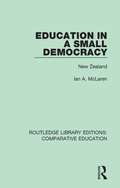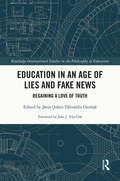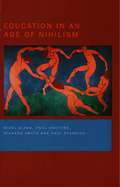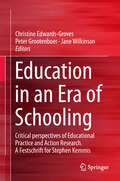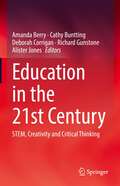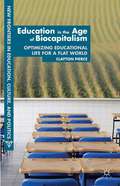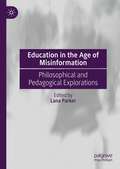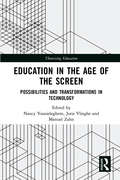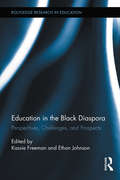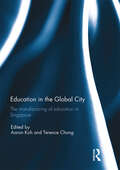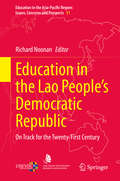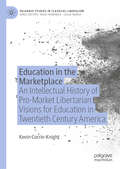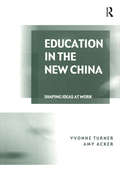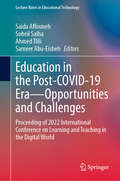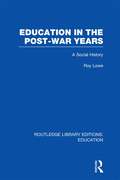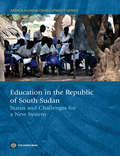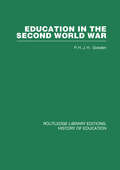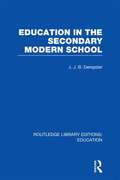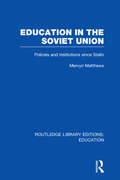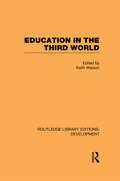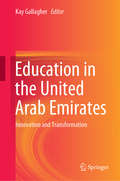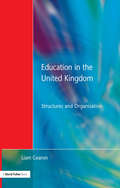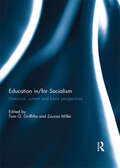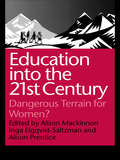- Table View
- List View
Education in a Small Democracy: New Zealand (Routledge Library Editions: Comparative Education)
by Ian A. MclarenOriginally published in 1974. Here is a detailed discussion of educational change in New Zealand with implications which should provoke a fresh approach both to the educational tradition in Britain and to the problems of other educational systems which are subject to democratic control. It is primarily concerned with developments in the quarter-century between 1945 and 1970. With frequent reference to events preceding and following this period, the author stresses throughout the professed educational ideal of all post-war New Zealand governments: to provide equality of opportunity in education. He deals with principles of policy and administrative control, including the universities and estimates the influence on official policy of interest groups inside and outside the educational system. He examines social issues which include the extent to which governments have failed to promote equality of opportunity in the schooling of minority groups in the country, and treats, in an historical perspective, the perennial vexed question of state aid to private schools. The concluding chapters describe and analyse the characteristics, difficulties and prospects of primary, secondary and tertiary education.
Education in an Age of Lies and Fake News: Regaining a Love of Truth (Routledge International Studies in the Philosophy of Education)
by Jānis John Tālivaldis Ozoliņš João J. Vila-ChãThe ‘post-truth’ world in which we live has been beset by fake news, lies and a cavalier disregard for truth. If truth is neglected then an alternative is an appeal to the emotions in order to validate a particular position, which can quickly turn to the use of power to impose a particular view. The loss of truth results in the loss of freedom. This book contends that if we want to preserve our freedom then we have a serious obligation to pursue truth. One way to do this is through an adequate moral education. Education in an Age of Lies and Fake News: Regaining a Love of Truth makes an argument for the importance of truth. It explores how we can retrieve the concept of truth and how moral education can be deployed in order to re-establish a commitment to truth. It introduces Eastern perspectives on the question of truth and how we view reality, and presents a realist position on the nature of truth as a counter to scepticism, drawing on Augustine and Thomas Aquinas, amongst others. Further, the chapters are mindful of the significance of developing a pedagogy which not only enables students to be critical thinkers, but to foster a genuine concern for truth and for its pursuit. This book will be essential reading for students, educators, philosophers and researchers pursuing the question of truth in the modern age.
Education in an Age of Nihilism: Education and Moral Standards
by Richard Smith Paul Smeyers Paul Standish Nigel BlakeThis book addresses concerns about educational and moral standards in a world increasingly characterised by nihilism. On the one hand there is widespread anxiety that standards are falling; on the other, new machinery of accountability and inspection to show that they are not. The authors in this book state that we cannot avoid nihilism if we are simply laissez-faire about values, neither can we reduce them to standards of performance, nor must we return to traditional values. They state that we need to create a new set of values based on a critical assessment of contemporary practice in the light of a number of philosophical texts that address the question of nihilism, including the work of Nietzsche.
Education in an Era of Schooling: Critical Perspectives Of Educational Practice And Action Research. A Festschrift For Stephen Kemmis
by Peter Grootenboer Jane Wilkinson Christine Edwards-GrovesThis book is a Festschrift for Emeritus Professor Stephen Kemmis, who has a long and eminent career as an educational researcher and academic spanning over 40 years. His work in curriculum, evaluation, critical practice, action research and practice theory has been influential across all continents of the world.The book examines critical perspectives on educational practice and the participatory nature of action research, including practitioner research particularly as undertaken by teachers in schools. Including vignettes from Kemmis’ colleagues and mentors, it draws on contributions from a range of academics whose scholarship has been inspired, influenced and initiated by his work. The chapters stem from a range of countries, including Australia, Canada, Finland, weden, the United Kingdom, United States of America, and Trinidad and Tobago - a testimony to the enduring and global legacy of Kemmis’ scholarship. Contributing authors include leading educational research scholars, indigenous elders from Australia, and community leaders concerned with environmental sustainability.The concluding focus of this book turns towards practice theory. Kemmis’ later work led to the development of the theory of practice architectures and gave rise to the development of the theory of ecologies of practices in education. Research drawing on the theory of practice architectures and ecologies of practices resulted in the leading text “Changing practices, changing education” (Kemmis, Wilkinson, Edwards-Groves, Hardy, Grootenboer & Bristol, 2014, Springer) that reports on an Australian investigation of the ecological relationship between student learning, teaching, professional learning, leading and researching practices.This theory is now being applied to study practices across a wide range of international contexts, sites and disciplines including early childhood, school education, university education, vocational education and training, community environment, indigenous cultural sustainability and health.
Education in the 21st Century: STEM, Creativity and Critical Thinking
by Amanda Berry Alister Jones Cathy Buntting Deborah Corrigan Richard GunstoneThis book explores a range of issues central to STEM and 21st Century education. It explores research into the relationships between creativity, critical thinking and STEM Education from both a theoretical and practical perspective. It examines matters associated with three main concerns: First is the ways some research and development that is labelled “STEM” appears to be essentially one of the specific individual components, S, T, E or M, with a new label rather than something going across and/or beyond these more traditional components. The second, at times intertwining, concern is the common ways in which school curriculum continues to hold separate disciplines as its core. The third concern is that while cross-curriculum goals are increasingly common in this century - particularly for “creativity” and “critical thinking” - it is also common that the goals remain only vaguely linked with the more usual components of the whole curriculum. This book reflects on all three of these important concerns and the integrated whole that can result from them. Monash University, King’s College London and Waikato University have now generated six edited books on successive related research issues of significance to contemporary science education. Each of these books has been substantially shaped by a writing workshop involving all authors in intensive discussion about drafts of their contributions (a process of great worth in its own right, as well as for enhancing the value of the final volume), and then each author reworking the contribution in the light of the discussions The seventh will extend beyond science education and explore a range of issues central to STEM and 21st Century education.
Education in the Age of Biocapitalism
by Clayton Pierce"This book is an in-depth examination of the growing alignment between powerful global bioindustries and education reform in the U. S. Utilizing a biopolitical methodology, the book focuses on how value-added measures and other neoliberal strategies embedded in policies such as 'race to the top' are involving schools in a project to manage and regulate educational life for competing in a new 'flat world'. Understanding the educational present, this work argues, requires individuals to consider what advanced industrialized nations across the globe are viewing as the future. Biocapitalist development in areas such as genetic engineering, drug therapies, and cellular cloning is the promissory future driving nations like the U. S. to out-compete and out-educate one another at any cost. This book assesses the implications for education in the biocapitalist era and points to alternative futures not based on such a vision of life and its productive potential"--
Education in the Age of Misinformation: Philosophical and Pedagogical Explorations
by Lana ParkerThis edited volume examines the implications of misinformation and youth digital life in a new information environment. This new information environment is characterized by high levels of user engagement, hidden algorithmic manipulations, and information abundance, including misinformation and disinformation. While misinformation and disinformation in the post-truth era have been previously investigated, this edited volume offers a distinctive educational focus that scholars have not yet addressed. Chapters contribute to the ongoing discussion of the role of education in democracies while uniquely contextualizing the problem of misinformation as a pedagogical opportunity. Contributions from across the globe answer the question of how education might respond to the changing information environment through engagements with educational philosophy, democracy, and everyday practices of teaching and learning. The book adds to a growing body of work exploring what it means to engage in responsive, rather than reactive or stagnant, pedagogy.
Education in the Age of the Screen: Possibilities and Transformations in Technology (Theorizing Education)
This edited volume brings together experts from across the field of education to explore how traditional pedagogic and didactic forms and processes are changing, or even disappearing, as a result of new technologies being used for education and learning. Considering the use, opportunites and limitations of technologies including interactive whiteboards, tablets, smart phones, search engines and social media platforms, chapters draw on primary and secondary research to illustrate the wide-reaching and often salient changes which new digital technologies are introducing into educational environments and learning practices around the world. Neither claiming that traditional forms of learning must be replaced, nor calling for a restoration of the school, Education in the Age of the Screen offers a nuanced exploration of the implications of digitization for education. Taking a broad view on education as a social and cultural phenomenon, the volume focuses on three major dimensions: the wider conditions against the background of which we educate and are educated today, detailed examples of aesthetic practices and educational initiatives in the current media culture, and concrete answers to the challenges that come our way. A comprehensive and timely consideration of the state of education in the digital age, this will be of interest to researchers, academics and post-graduate students in the fields of education and pedagogy, media and cultural studies, as well as teacher educators and trainee teachers.
Education in the Best Interests of the Child
by R. Brian Howe Katherine CovellA large body of research in disciplines from sociology and policy studies to neuroscience and educational psychology has confirmed that socioeconomic status remains the most powerful influence on children's educational outcomes. Socially disadvantaged children around the world disproportionately suffer from lower levels of educational achievement, which in turn leads to unfavourable long-term outcomes in employment and health. Education in the Best Interests of the Child addresses this persistent problem, which violates not only the principle of equal educational opportunity, but also the broader principle of the best interests of the child as called for in the UN Convention on the Rights of the Child.Building on the children's rights work accomplished in their previous book, Empowering Children, Brian Howe and Katherine Covell identify three types of reform that can significantly close the educational achievement gap. Their findings make an important argument for stronger and more comprehensive action to equalize educational opportunities for disadvantaged children.
Education in the Black Diaspora: Perspectives, Challenges, and Prospects (Routledge Research in Education)
by Kassie Freeman Ethan JohnsonThis volume gathers scholars from around the world in a comparative approach to the various educational struggles of people of African descent, advancing the search for solutions and bringing to light new facets of the experiences of black people in the era of globalization.
Education in the Global City: The manufacturing of education in Singapore
by Aaron Koh Terence ChongEducation in the Global City examines education in Singapore through the critical lens of ‘manufacturing’. The book brings together two disparate fields which inform each other, education and the ‘global city’; and the book’s contributors analyse and critique the manufacturing of Singapore education and Singapore’s global city formation. The collection covers vocational education, language policies, Higher Education, English education, critical thinking, sex education, creativity, and critical feminist scholarship.Collectively, the book pries open the ideology of the manufacturing education system, and points out the tension between the nation and its ideologies, and the ‘global city’ aspirations. It also asks how education contributes to, and is shaped by, the market realities of Singapore’s global city ambitions – which are at odds with the nationalistic local agenda and priorities of nation-building. In interrupting and speaking against the prevailing (and narrow) manufacturing of education for a teleological end, in spite of Singapore’s successful nation-building, this book is an important contribution to critical education scholarship.This book was originally published as a special issue of Discourse: Studies in the Cultural Politics of Education.
Education in the Lao People’s Democratic Republic: On Track for the Twenty-First Century (Education in the Asia-Pacific Region: Issues, Concerns and Prospects #51)
by Richard NoonanThis book provides a comprehensive and in-depth description of the education system in Lao PDR. It covers pre-school, primary, secondary general, secondary technical and vocational, post-secondary non-higher education, and adult non-formal education and training. In addition to the main content, the book includes a glossary of terms and abbreviations used; and an appendix on the organizational structure of the Ministry of Education and Sports, including the linkages between the national, provincial and district level. The content covers public and private sector education provision alike.
Education in the Marketplace: An Intellectual History of Pro-Market Libertarian Visions for Education in Twentieth Century America (Palgrave Studies in Classical Liberalism)
by Kevin Currie-KnightThis book offers an intellectual history of the libertarian case for markets in education. Currie-Knight tracks the diverse and evolving arguments libertarians have made, with each chapter devoted to a different libertarian thinker, their reasoning and their impact. What are the issues libertarians have had with state-controlled public schooling? What have been the libertarian voices on the benefits of markets in education? How have these thinkers interacted with law and policy? All of these questions are considered in this important text for those interested in debates over market mechanisms in education and those who are keen to understand how those arguments have changed over time.
Education in the New China: Shaping Ideas at Work
by Yvonne Turner Amy AckerThe effects of the de-regulation of the Chinese university system have been nothing short of spectacular. For the first time since 1949, students possessing neither gifted intellect nor political connections have been able to share in the benefits of higher education, while a flood of international educators have opened up a previously cloistered and politically sensitized academic world. This fascinating book examines China’s higher education system, and how it’s new and unique blend of foreign and Chinese perspectives impact on both the lives of students and academics and wider Chinese society. Viewed with suspicion as a new type of Chinese by the older generation and by the government, they are at the same time the very entrepreneurs driving the economic and social revolution sweeping the country. Using a range of in-depth interviews and unique research, it provides open and often frank accounts of life, work and education in China, from the Cultural Revolution to the creation of its market-focused entrepreneurial generation. Candid and illuminating, this is a book no serious reader of Asian studies, comparative education or Asian sociology will want to be without.
Education in the Post-COVID-19 Era—Opportunities and Challenges: Proceeding of 2022 International Conference on Learning and Teaching in the Digital World (Lecture Notes in Educational Technology)
by Ahmed Tlili Saida Affouneh Soheil Salha Sameer Abu-EishehThis book offers authors’ practices, initiatives, and experiences in sustaining their education during the pandemic from different countries, contexts, and political situations. It provides a future prediction for the education system in the world due to the transformation that happened in the post-COVID-19 era. Each chapter of the book is expected to shed light on different countries describing their education system in the past, present, and future. The readers of the book will be able to learn, compare, and analyze the differences and similarities between the educations offered to learners around the world.The book also presents a new model of e-learning that will help learners, teachers, and educational systems to participate in achieving sustainable development goals. The book introduces several scenarios of types of learning and how to plan, design, and implement them in F2F and online environments.
Education in the Post-War Years: A Social History (Routledge Library Editions: Education)
by Roy LoweThis book provides an overview of the relationship between the sweeping social changes of the post-war period and education in England. It outlines the major demographic cultural and socio-economic developments which made new demands of the education service during the twenty years following the War and analyses the responses made by schools, colleges and universities. The book provides not only an informed narrative of the development of formal education, but also an authoritative account of the ways in which suburbanisation and the growth of the new property-owning middle class determined both the rhetoric of education and the structure of the system which emerged through the implementation of the 1944 Education Act.
Education in the Republic of South Sudan
by World Bank StaffAs part of the Country Status Report series, this book provides a comprehensive review of the status of education in post-conflict South Sudan. It is a result of collaborative work between MOE, key education stakeholders in South Sudan, and the World Bank. The aim is to contribute to the development of a shared vision for the future of the education system between government, citizens, and partners of the new South Sudan. With the signing of the Comprehensive Peace Agreement in 2005 began the establishment of a new education system specifically for South Sudan. Primary school enrollments approximately doubled between 2005 and 2009 from 0. 7 million to 1. 4 million; yet, the recent rapid growth has resulted in a concentration of students in the early grades, a high proportion of overage students, repetition, dropout, and weak levels of student learning. Thanks to the detail it offers, this book provides a solid foundation for dialogue about the future of education in South Sudan and will immediately be used to inform the preparation of an Education Sector Plan for the new country. The book underlines the strong progress that South Sudan has made in terms of expanding access to education, but also the many challenges that lie ahead. In particular, it sheds light on such questions as: Is everyone getting a chance at education? How much are students learning? What is the situation of schools and service delivery? What is South Sudan investing in education and how is it using these resources? Are the resources well-deployed and managed to ensure efficient functioning of the education system? The book offers a valuable and comprehensive resource for anyone interested in education in South Sudan.
Education in the Second World War: A Study in policy and administration
by Peter GosdenOriginally published in 1976, this substantial study of wartime education,shows how the framework of the present educational system came to be established in the 1944 Education Act.
Education in the Secondary Modern School (Routledge Library Editions: Education)
by J JB DempsterThe articles which make up this book, originally published in the journal The Schoolmaster were originally published at the time of The Education Act 1944 which changed the education system for secondary schools in England and Wales. This Act made secondary education free for all pupils and introduced the tripartite system of education, of which secondary modern schools were one part. This volume examines issues of low self-esteem among pupils at secondary modern schools, academic versus practical curricula, assessment and challenges for teachers – issues which are still pertinent today.
Education in the Soviet Union: Policies and Institutions Since Stalin (Routledge Library Editions: Education)
by Mervyn MatthewsThis book provides a comprehensive survey of the successes and failures of education and training in the Khrushchev and Breshnev years. The author gives an objective assessment of the accessibility of the main types of institution, of the contents of courses and of Soviet attempts to marry the functioning of their education system to their perceived economic and social needs. In addition the book has many useful and original features: For ease of analysis it summarises in diagram form complex statistics which are not usually brought together for so long a time period. It provides a systematic account of educational legislation; Matthews’ comparison of series of official decrees will allow subtle shifts in government policy to be accurately charted. Particular attention is also paid to a number of issues that are often neglected: the employment problems of school and college graduates; the role and professional status of teachers; political control and militarisation in schools; the close detail of higher education curricula; and the rate of student failure. Of special value is the chapter on those educational institutions which are often omitted from Western studies and which are hardly recognised as such in most official Soviet sources.
Education in the Third World (Routledge Library Editions: Development)
by Keith WatsonThis reissue examines the crucial question of how the education systems of Third World countries continue to be influenced by the former colonial powers, arguing that decisions and views made early in the twentieth century cannot always be so readily condemned from the standpoint of the 1980s. The study begins by placing the problem in its historical context and goes on to examine different regions of the Third World influenced by colonialism. It concludes with a contemporary global overview of current colonial dependency and provides a detailed and comprehensive bibliography on different facets of education and colonialism.
Education in the United Arab Emirates: Innovation and Transformation
by Kay GallagherThis book provides an overview of the evolution of education in the United Arab Emirates from its humble beginnings in palm frond huts, to today’s proliferation of prestigious international schools and global university branch campuses. The chapter authors are academic experts who have extensive first-hand experience of contemporary developments in the country’s various educational sectors. The book addresses innovations and transformations in Early Childhood Education, Higher Education, K-12 Schooling, Language Education in Arabic and English, Quality Assurance, Special Needs, STEM Education, and Teacher Education and Professional Development.
Education in the United Kingdom: Structures and Organisation
by Liam GearonThis accessible book provides a basic understanding of the structure and organization of education in the United Kingdom in a time of rapid change and devolved government. It is designed as an introductory guide and reference work for all with an interest in education, including trainee and newly qualified teachers, university lecturers, school-based mentors, and governors and managers. It contains an accessible summary of key issues and contributions from some of the best-known writers in the field.
Education in/for Socialism: Historical, Current and Future Perspectives
by Tom G. Griffiths and Zsuzsa MilleiThis book re-examines aspects of historical socialism, and includes case studies of education within twenty-first century socialist and post-socialist contexts shaped by the trajectories of historical socialism. Through these case studies, contributions offer insights into key questions: How are education systems and student subjectivities shaped by post-socialist trajectories and current regional politics, economics and resistance movements? How do sedimented socialist discourses and geographies alter and contest the ‘neoliberal child’ and ‘childhood’ in post-socialist education? How have disjunctures between the rhetoric of historical Marxism-Leninism and the practices of educators, students and student political organizations played out under socialism, and what could we learn from that for our present? How much emancipatory potential is there in the theories and practices of (popular) education for combatting injustice in the absence of mass, revolutionary political parties? Above all, this volume affirms the need to move beyond simplistic accounts of historical socialism and post-socialist transitions. By exploring how socialist trajectories remain influential and have potential in our current contexts, this book contributes to the work of politically engaged educators working to re-imagine and reconstruct education. This book was originally published as a special issue of Globalisation, Societies and Education.
Education into the 21st Century: Dangerous Terrain For Women?
by Inga Elgquist-Saltzman Alison Mackinnon Alison PrenticeThe combined effort of 19 feminist educators and theorists from four continents, this exciting collection of essays is designed to be as wide-ranging intellectually as it is geographically. Probing the abilities (and dis-abilities) of women in education from the mid-19th century to the present, it brings historical analysis, classroom research, and theoretical reflection to bear on gender issues in schooling and higher education. 'What about the boys?' cry alarmists who fear a feminist takeover in schools. 'What about them indeed?', say students of women's education who wonder if it is now time to engage more explicitly and directly with the politics of male advantage in education, as well as in economic, political, social and cultural life.
